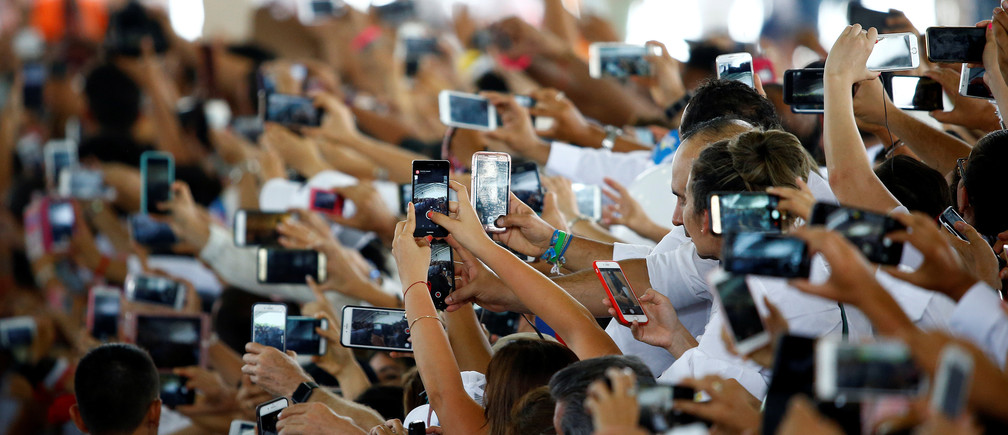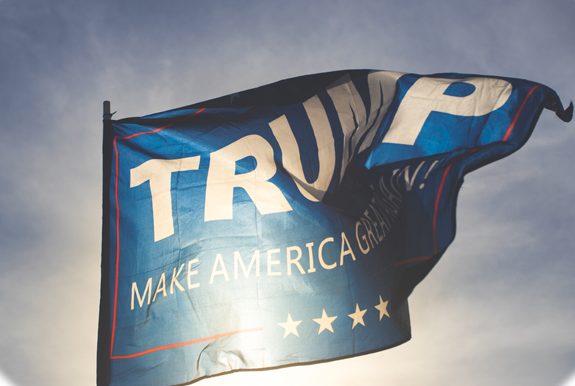Democracy and despotism in a digital age.
A Deplorable Looks for a Date

I am a widower of nearly two years who recently decided to look for a lady companion.
Where to begin? Not online. I had signed up for Facebook in its early days, but upon receiving a deluge of friend requests—some from people I would not remotely call “friends”—I ran for the hills. I suppose I am one of those who never figured out what is social about “social media.” So, instead of the internet, I took the more conventional route: I asked a friend. In short order she came up with someone age-appropriate (I’m 65) and living in New York (like me). There was, however, a snag.
This woman, whom I shall call Susan, hesitated after being told that I was a Trump supporter. But she learned that my wife had been a liberal feminist. This, so my yenta informed me, redeemed me, at least somewhat. I wrote, proposing a date. After a few days she wrote back. It turns out that she had had second thoughts. She wasn’t terribly picky, she implied, but she did have a line in the sand—a “red line,” as she put it, and I was on the wrong side. It was a friendly note. She said she was sure I was a catch and would find a good fit, just not her.
I wrote back to ask her to reconsider. I called attention to the fact that she was, in effect, placing me in the camp of the “deplorables.” I then asked rather pointedly whether she was so sure that she knew enough about me—or about politics—to make such a judgment? If she apologized, I figured, then she was honest and open-minded enough that a date might work out. I judged the odds something less than de minimis, but I thought there was no harm in trying. If we did end up together, we would have a novel response to the “how-did-you-meet” question.
Then, as people do, I imagined our first date. In most instances I would steer clear of politics, but in this case Trump would be at the top of the agenda. What would I say? First, I would concede that Trump the man is every bit as despicable as she thinks. That’s about half true, but at that point in our acquaintance I deemed it would be an acceptable fib. And then I would offer her an analogy. Imagine a drunken gambler with a woman on each arm. He passes out and hits his head on a large vein of gold. This, too, does not give Trump the credit he deserves—he has any number of good qualities. But the purpose of the analogy would be to point out that sometimes a person of low character hits on a good thing.
Trump, as I have written, “exposed multiculturalism as the revolutionary movement it is.”
He showed us that multiculturalism, like slavery in the 1850’s, is an existential threat. Trump exposed this threat by standing up to it and its enforcement arm, political correctness. Indeed, he made it his business to kick political correctness in the groin on a regular basis. In countless variations of crassness, he said over and over exactly what political correctness prohibits one from saying: “America does not want cultural diversity; we have our culture, it’s exceptional, and we want to keep it that way.”
Even if Trump did nothing more than expose multiculturalism, he would have made a very significant contribution. Again, I think Trump has done more, but the analogy would go far enough for my purposes. I didn’t suppose Susan would find all this convincing. But perhaps it would be sufficient to land me in the realm of the sane.
Then again, perhaps not.
I imagined making a few other observations. I could tell her that she knew many people she deemed respectable who had voted for Trump. To be sure, none of her friends had done so, but there were undoubtedly many acquaintances—shopkeepers, doormen and other blue-collar workers, for example—who had. She might respond as my liberal friends often respond: Trump supporters may not all be racists, but they are all either ignorant or ill informed. It seems odd that liberals would hold the common man, for whom they often profess great concern, in such contempt. Of course, liberals may not be inconsistent after all: they may believe that the ignorant and uninformed require the assistance of the better class. They seem to think that the common man needs liberals to think for him. But these thoughts I likely would keep to myself.
There was still another tack. Many of my liberal friends are boycotting fitness clubs such as Equinox that are owned by Stephen Ross, because he is holding a fundraiser for Trump. But aren’t there many business owners who support Trump? Presumably, the principles of my friends would require them to boycott these as well. To extend these principles one step further, would it not be “principled” to boycott stores that even hired Trumpsters? Or, taking them to their logical extreme, would not liberals have to avoid all those who in any way fraternized with, patronized and perhaps even talked to Trumpsters?
One last point rose to mind, even if it too might be better left unsaid on a first date. Some conservatives would claim that my being turned down because of my politics is an example of the closed-mindedness of liberals. Perhaps. Though it may just be that conservatives like me, surrounded as we are by liberals, would end up dateless if we limited ourselves to conservatives. As an example of the liberal-conservative imbalance in New York City, in my election district on the Upper West side of Manhattan, out of 12,000 people, a whopping four voted for Trump. Two of these four, a married couple, I am friends with. The odds that the fourth is Miss Right are not in my favor.
But, even acknowledging that conservative openness is born of necessity, it may also be true that the governing ideology of conservatives—classical liberalism—demands more openness than the ideology of liberals—multiculturalism. Although classical liberalism may not allow speech and behavior that seriously undermines its principles, it does allow, indeed encourages, speech that challenges those principles. Multiculturalism, on the other hand, prohibits all challenges; it even prohibits terms such as “American exceptionalism” (when used positively), which, according to the multiculturalists, foreshadow a challenge. I wonder how Susan would answer the claim that liberals are less open minded than conservatives.
So how did Susan respond to my rather pointed email of a few days ago?
She hasn’t. I’ll keep you posted.
The American Mind presents a range of perspectives. Views are writers’ own and do not necessarily represent those of The Claremont Institute.
The American Mind is a publication of the Claremont Institute, a non-profit 501(c)(3) organization, dedicated to restoring the principles of the American Founding to their rightful, preeminent authority in our national life. Interested in supporting our work? Gifts to the Claremont Institute are tax-deductible.
In 2010, Claremont Institute Senior Fellow Angelo Codevilla reintroduced the notion of "the ruling class" back into American popular discourse. In 2017, he described contemporary American politics as a "cold civil war." Now he applies the "logic of revolution" to our current political scene.
Claremont Institute Senior Fellow John Marini is one of the few experts on American Government who understood the rise of Trump from the beginning of the 2016 election cycle. Now he looks to the fundamental question that Trump's presidency raises: is the legitimacy of our political system based on the authority of the American people and the American nation-state, or the authority of experts and their technical knowledge in the service of "progress"?




